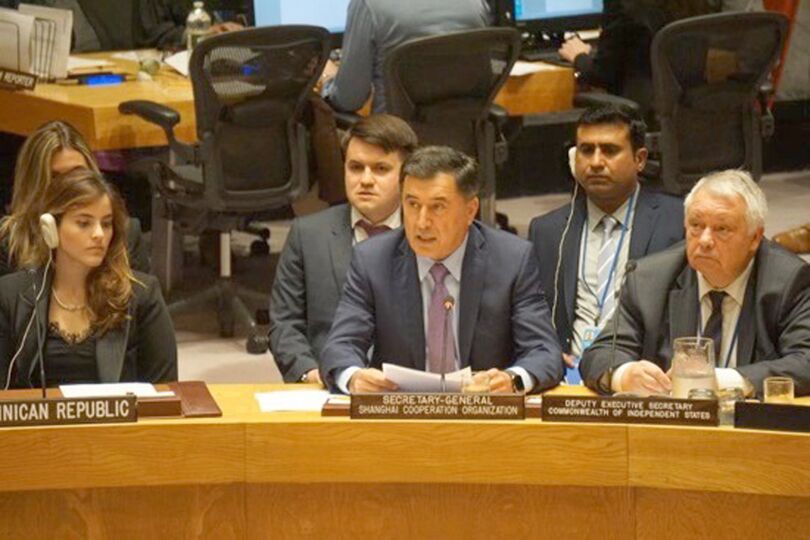On 25 September 2019, SCO Secretary-General Vladimir Norov attended a ministerial debate on Cooperation between the United Nations and regional and subregional organisations in maintaining international peace and security: The contribution by the CSTO, CIS, and SCO in countering terrorist threats. The invitation to the debate held in New York was issued by Russia, which is currently presiding at the UN Security Council.
The agenda of the debate included the fight against terrorism and extremism, preventing terrorists joining forces with drug traffickers and other types of organised crime groups, the situation in Afghanistan, as well as cooperation between regional organisations and specialised UN bodies on countering modern day threats and challenges.
Foreign Minister Sergey Lavrov said in his opening remarks that "the CSTO, the CIS and the SCO (…) have a lot of experience in combating terrorist threats" and that they "are making serious contributions to strengthening stability on the vast expanse of the Eurasian continent." He pointed out that they have "formed a solid package of legal documents regulating the various aspects of national counterterrorist activities," which is an effective contribution to the UN efforts on the antiterrorist track.
UN Secretary-General Antonio Guterres urged the UNSC member states and regional organisations to join forces in the implementation of the Global Counter-Terrorism Strategy. He also highlighted the importance of humanitarian aspects of counterterrorism that create conditions for taking preventive measures aimed at rooting out the causes of threats.
SCO Secretary-General Vladimir Norov focused on the growth of global instability due to the joining of forces between terrorist and cross-border organised crime groups, the movement of foreign terrorist fighters from the conflict areas to other parts of the world, as well as the possibility of terrorist organisations using radioactive and toxin weapons and new forms of financing and weaponry.
Vladimir Norov pointed out that the fight against terrorism and related threats had been among the SCO's key priorities since the establishment of the organisation. He noted that "the SCO has a developed legal framework and practical mechanisms for effective cooperation when it comes to security. The organisation has adopted over 600 multilateral documents in this field. Many of them, including the SCO Convention on Counter-Terrorism and the SCO Convention on Countering Extremism, are open for signing to all states."
The SCO Secretary-General told the audience about the operations of the Regional Anti-Terrorist Structure (RATS). "In 2018 alone, over 360 terrorist crimes were prevented with the coordinating role of RATS, over 80 secret terrorist cells were neutralised and 67 terrorist fighters, including more than 10 terrorist leaders, were eliminated," he said. "Much has been done to prevent the financing of terrorism,
illegal trafficking in arms and explosive devices, as well as online recruitment of terrorists. Last year, access to over 160,000 online resources that contained terrorist and extremist material was restricted."
Vladimir Norov added that the settlement of the conflict in Afghanistan was among the main factors of security and stability in the region. He pointed out the SCO's role in that field and recalled the Roadmap for Further Action of the SCO-Afghanistan Contact Group, which was adopted at the SCO summit held in Bishkek in June 2019 to support the efforts to restore peace, promote economic development in Afghanistan and fight terrorism and drug trafficking.
The SCO Secretary-General added that the SCO's successful experience in the fight against drug trafficking had attracted the attention of international organisations. "We are actively cooperating with the UN Office on Drugs and Crime and regularly hold joint events on the sidelines of the Commission on Narcotic Drugs. We also hold joint expert meetings with the Paris Pact Initiative, which will convene for a regular meeting in Shanghai in November 2019," Vladimir Norov said.
He highlighted the importance of the SCO's support for the UN peace and security activities. "Seeking to help implement the Global Counter-Terrorism Strategy and UN Security Council resolutions on counterterrorism, we are actively developing cooperation with the relevant UN bodies and other international and regional organisations. We are strengthening interaction with the UN Security Council Counter-Terrorism Committee, the UN Office of Counter-Terrorism and the UN Regional Centre for Preventive Diplomacy for Central Asia," the SCO Secretary-General pointed out.
Vladimir Norov placed particular emphasis on the importance of humanitarian aspects of the fight against terrorism and extremism. "The SCO is expanding inter-ethnic, inter-religious and inter-civilisational dialogue on the basis of mutual trust, respect and equality of the sides. Joint measures are being taken to prevent the involvement of young people in terrorist and extremist groups. We are improving the legal framework for the full implementation of young people's rights and their access to knowledge and education. Of particular importance in this context is the drafting of the UN Convention on the Rights of Young People," the SCO official noted.
He called on the international community to strengthen global cooperation in the fight against terrorism, to prevent any attempts to undermine the central role of the UN as a universal multilateral organisation working for international peace, security and stability, as well as to strive for consensus on the adoption of the proposed Comprehensive Convention on International Terrorism.
Vladimir Norov pointed out that the SCO would continue to strengthen multifaceted cooperation with the UN and the UN Security Council.
Other speakers at the event were the foreign ministers and delegation heads of the SCO member states and observer countries, the CIS and CSTO member states, plus UN Security Council members.
